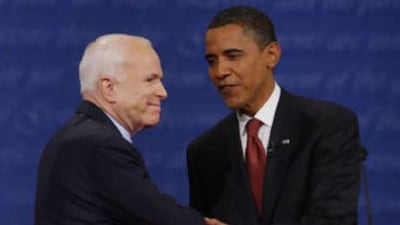OXFORD, MISSISSIPPI // Curtis Wilkie's final year as a journalism student at the University of Mississippi began in the autumn of 1962 in a way he wished it had not: with a military presence on the normally quiet campus. US marshals had come to enforce a federal court order to enrol a young man named James Meredith, who had been denied admission to the segregated school because he was black. A violent riot broke out when students heard Mr Meredith had arrived. Army troops were called in. The National Guard was called up. By the time things turned quiet, two people were dead. Forty-six years later, on Friday, the university - where Mr Wilkie is now a journalism professor - welcomed to campus on wholly different terms another historic black figure: Barack Obama. If someone had told him then it would be just two generations until the first black major-party presidential candidate would set foot here, as Mr Obama did for his debate with John McCain, Mr Wilkie simply would not have believed it. "I would have said, 'you're crazy'," Mr Wilkie, 68, said last week. "He would have been impossible 20 years ago," he said of Mr Obama. "He would have been unimaginable 50 years ago." Mr Obama's candidacy may be historic for the country, and indicative of the progress made in America since the civil rights movement. But the fact that the University of Mississippi, the oldest university in the poorest US state, was chosen to host the first debate was equally symbolic. "If you put 1962 against 2008 and you consider the incident that occurred here in 1962, the irony is almost beyond description," Robert C Khayat, chancellor of the 17,000-student university, said. The school in this conservative southern city, whose central square displays a statue honouring Confederate soldiers who died in the Civil War, goes by the nickname "Ole Miss", a term of respect slaves used when referring to their master's wife. But in many ways, when it comes to racial issues, it has become a new Ole Miss, and students, faculty and residents have been trying to show how. "Obviously, there's great symbolism," said John Meredith, James Meredith's son, of Ole Miss hosting Mr McCain and Mr Obama. "I don't think anywhere in the country there is an institution that has made more significant strides than the University of Mississippi." It is not that race has gone away as an issue here; it has not. Ole Miss students still feel the weight of what happened in 1962, and that is the point. Almost everyone knows you can still see bullet marks on the façade of the Lyceum, a brick building that is the campus's oldest, from the night of the riot. There is a bronze statue of Mr Meredith nearby, including a plaque that notes the October day he "stepped into the pages of history". There is still a great deal of racial separation, as is the case in many corners of America. Walk into the student union cafeteria and it is obvious: by and large, white students eat with their white friends, and black students eat with their black friends. "It's de facto segregation," said Josh Davis, 31, a 1999 graduate of Ole Miss who grew up in Oxford and is raising his own family here. Still, there is something happening at Ole Miss that once never would or could have: people are talking constructively about race. Mr Davis, who is black, has helped spur that. He organised an event last year that brought together 80 students of different races, ethnicities and religions in small teams for dialogue on race relations, along with a scavenger hunt. That led to a three-day retreat in February called One Mississippi, also to tackle the issue of social segregation on campus. "The world is much bigger than this comfort zone they have," said Mr Davis, assistant director of alumni affairs for the university, who suggested that black students and white students at Ole Miss experience the university in very different ways. Nickolaus Luckett, 19, said he is thankful for what Mr Meredith did to pave the way for black students like himself. "We're at a different point now in history," he said. "Now we're moving into socially integrating the university." History looms large, even all these years later. Mr Meredith, who lives in Jackson, Mississippi, applied to Ole Miss in January 1961; four days later, he was denied admission. With the help of the National Association for the Advancement of Colored People, the NAACP, he took his case to court. He won the legal challenge but faced a much more difficult one when he arrived on campus. It took a few hundred federal marshals, 20,000 army troops and the full weight of the Mississippi National Guard to restore order. When Mr Meredith finally sat down for his first university class, everyone else in the room got up and left, his wife, Judy Meredith, said. "Understand, he was not here to be friends with anybody," Mrs Meredith explained. "He was here on a mission. He called himself a soldier. He was not hurt. He was not afraid. He does not feel he's a hero. He just feels as if this was something he had to do." Mr Wilkie, the journalism professor, has watched the school's complexion change, slowly, from that day when Mr Meredith made Ole Miss the first southern school to accept blacks. He wishes he did more to somehow support his classmate in 1962. "I should have, but I didn't," he said. Mr Wilkie, who is supporting Mr Obama in the presidential race this year, described the Illinois senator's arrival on campus for the debate with one word: gratifying. "I would never have dreamed we'd come as far as we have," he said. eniedowski@thenational.ae

The new 'Ole Miss' hosts debate full of symbolism
University that 46-years-ago was the scene of a riot because of the enrollment of a black student welcomes Obama.
Most popular today
